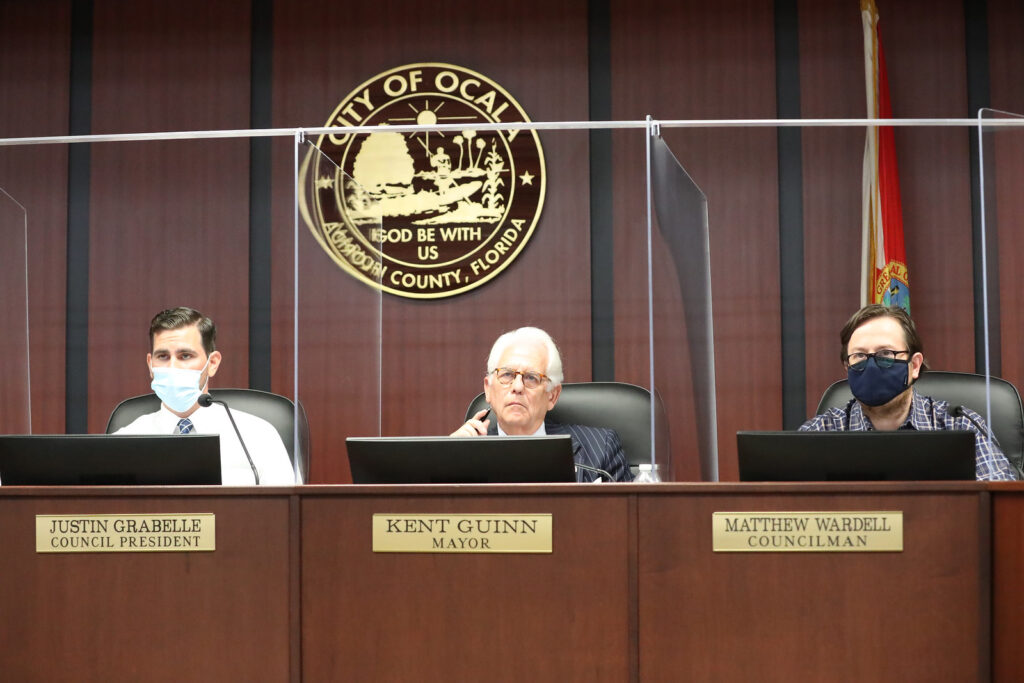City sued over panhandling ordinance

Council President Justin Grabelle, Ocala Mayor Kent Guinn and Councilman Matt Wardell, left to right, listen during an Ocala City Council meeting at Ocala City Hall in Ocala, Fla. on Tuesday, Dec. 15, 2020. [Bruce Ackerman/Ocala Gazette] 2020.

Council President Justin Grabelle, Ocala Mayor Kent Guinn and Councilman Matt Wardell, left to right, listen during an Ocala City Council meeting at Ocala City Hall in Ocala, Fla. on Tuesday, Dec. 15, 2020. [Bruce Ackerman/Ocala Gazette] 2020.
The suit, filed on Monday by the Southern Legal Counsel and American Civil Liberties Union (ACLU), contends the city’s panhandling ordinances are unconstitutional.
It is the second lawsuit filed by the two entities against the city since 2019. The first suit, which also included Ocala lawyer Andy Pozzuto, argued the city’s “open lodging” ordinance was unconstitutional.
In February, U.S. District Judge James Moody ordered the city to stop arresting homeless people for sleeping in public. He also ordered the city to stop issuing trespass warnings without due process. The city responded by amending the ordinance to remove the mention of homeless people and updated its trespass warning policy.
In Monday’s lawsuit, the groups argue the panhandling ordinances infringe on people’s First and Fourteenth Amendment rights and criminalizes people asking for help.
The groups are representing Roger Luebke, Kimberly Burnham, Williams Taylor, Victor Hoyt Cox, Dustin Damico and Patrick McArdle. All were previously arrested under the ordinances, according to the complaint.
The plaintiffs have spent a total of 209 days in the Marion County Jail and have been assessed more than $7,750 in fines due to the panhandling ordinances.
The city first adopted its Roadway Solicitation ordinance on Feb. 5, 2008, making it unlawful for any person to stand in the street, highway, median or bicycle path and solicit or attempt to solicit from those in vehicles.
According to the complaint, to enforce the ordinance, a police officer must examine the content of a person’s speech to determine if they are soliciting.
“We value free speech in this country and in Florida. Just as individuals have the right to discuss politics, religion, the weather, or education in public spaces, individuals have the right to ask for help in public spaces,” Jacqueline Azis, a staff attorney with the ACLU of Florida, said in a release. “Time and time again, courts have recognized our right to ask for charitable assistance. Ocala’s law is not unique, and it is as unconstitutional as other similar ordinances that courts have struck down throughout Florida and throughout this country.”
The lawsuit further challenges the City’s current panhandling ordinance, which was revised on Nov. 6, 2018.
In 2018, the city made additions to the ordinance making it unlawful to panhandle within 20 feet of business entrances and exits; bus stops and other public transportation facilities; ATMs and similar machines; any parking lot, parking garage parking meter or parking pay station operated by the city; public restrooms and gas pumps.
It also prohibits panhandling after dark and expands the definition of “aggressive panhandling,” which includes obstructing, blocking or impeding an individual or group of people from passing by a panhandler.
“Ocala’s ordinances prohibiting people from asking for help are unconstitutional under the First and Fourteenth Amendments,” lead counsel Chelsea Dunn of Southern Legal Counsel said in a release. “Every individual in this case has been subject to arrest based on the content of their speech. They have been jailed and assessed fines for acts as harmless as asking a stranger for a cigarette.”
Rob Batsel, the city’s lawyer, said they had not received the lawsuit as of Tuesday afternoon. He also said the city’s policy is not to comment on pending lawsuits.






